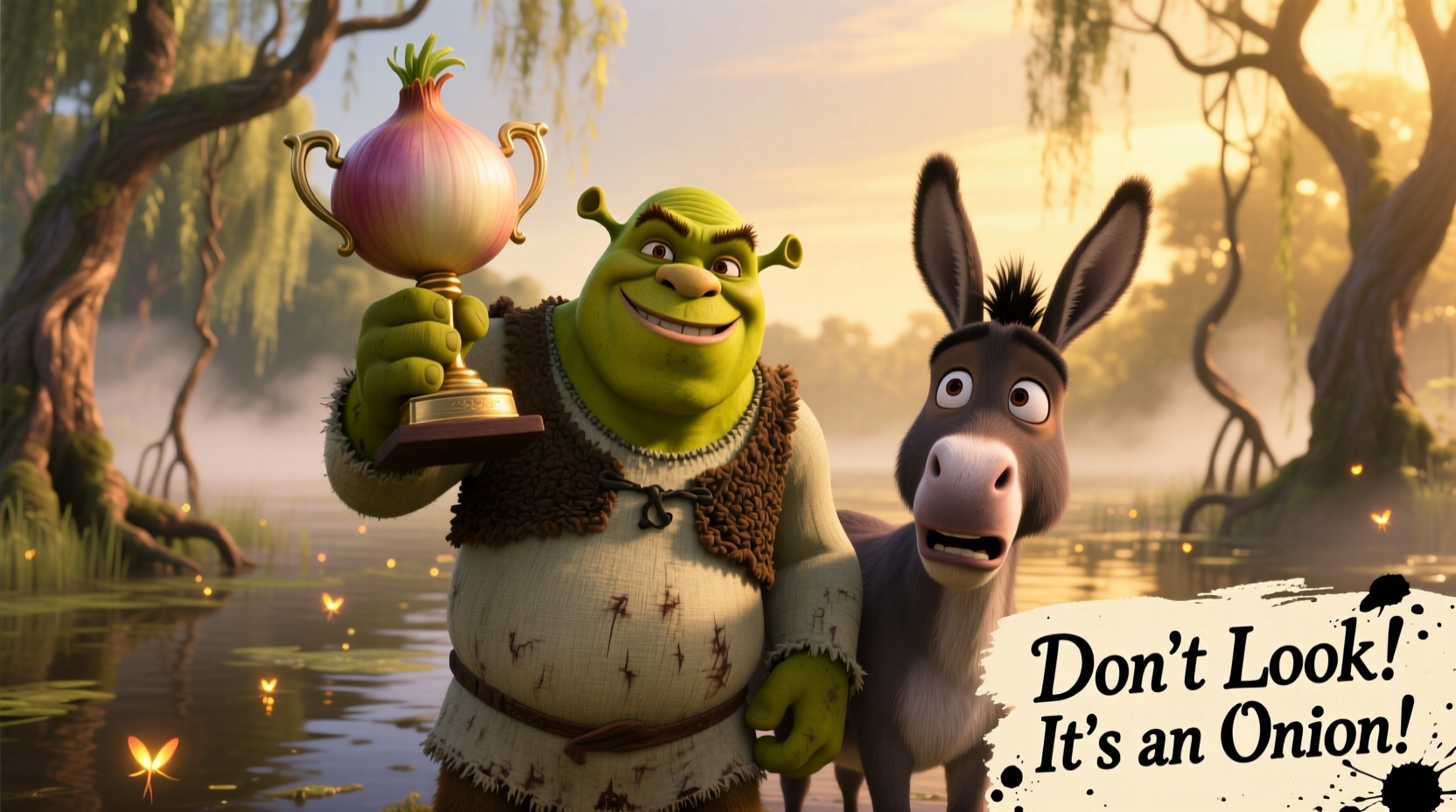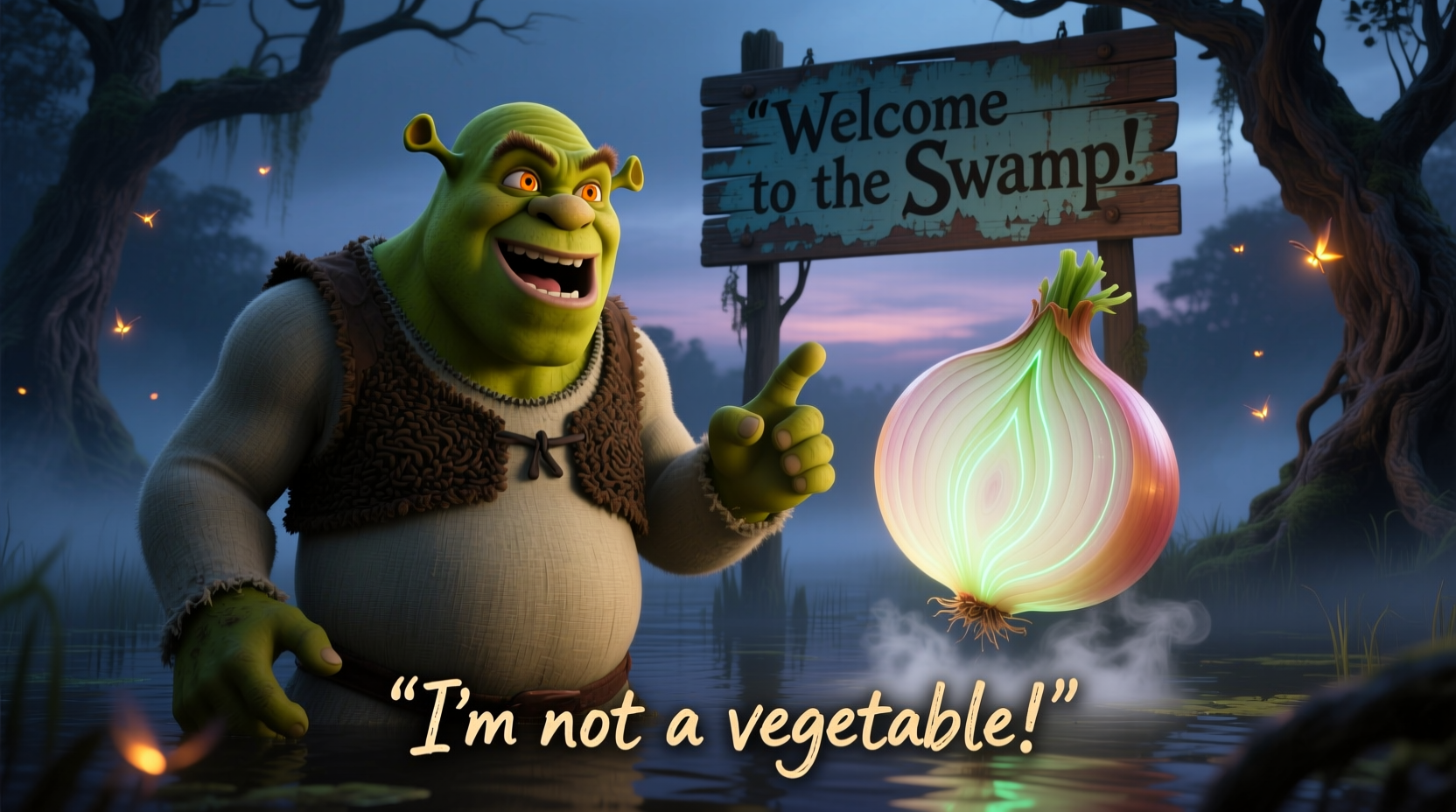When Shrek uttered those now-famous words “Ogres are like onions!” in the groundbreaking DreamWorks animation, he created one of cinema’s most enduring metaphors. This seemingly simple statement from the green ogre wasn’t just comic relief—it became the philosophical heart of a film that redefined animated storytelling. Let’s peel back the layers of this cultural phenomenon to understand why an onion comparison resonates so powerfully with audiences more than two decades later.
Where Does the Onion Quote Appear in Shrek?
The onion quote occurs during Shrek’s first extended conversation with Donkey, shortly after the talking donkey attaches himself to Shrek’s journey. As Donkey persistently tries to understand why Shrek isolates himself, the ogre grows frustrated with the interrogation. When Donkey asks “Why are you pushing everyone away?” Shrek responds with his now-iconic analogy:
“Ogres are like onions. Everybody’s got layers. You get it? We both have layers!”
This moment establishes the film’s central theme: appearances can be deceiving, and everyone has complexity beneath the surface. The scene’s brilliance lies in how it transforms a potentially clichéd metaphor into genuine character development through Shrek’s earnest delivery and physical demonstration (complete with onion-tearing).
Why Onions? The Metaphor’s Cultural Resonance
Shrek’s onion comparison works on multiple levels that explain its lasting impact:
- Universality – Almost everyone has experience with onions, making the metaphor instantly relatable
- Multi-sensory connection – Onions engage sight (layers), touch (peeling), smell (pungency), and even emotion (tears)
- Unexpected depth – Using a humble vegetable to explain complex emotional vulnerability creates memorable contrast
- Visual storytelling – The animation team cleverly shows Shrek tearing up while explaining, mirroring how onions make people cry
| Interpretation Level | Meaning | Cultural Significance |
|---|---|---|
| Literal | Ogres have physical layers like onion skins | Establishes Shrek’s non-human nature |
| Emotional | Complex feelings hidden beneath tough exterior | Challenges stereotypes about monsters |
| Philosophical | All beings have multidimensional identities | Promotes acceptance of differences |
Behind the Scenes: Creating an Iconic Moment
The onion quote wasn’t in the original William Steig picture book. Screenwriters Ted Elliott and Terry Rossio developed this metaphor specifically for the film adaptation. According to Animation World Network’s production history, the writers chose onions over other potential metaphors (like cabbages or artichokes) because:
- Onions produce tears, creating a physical manifestation of emotion
- The layering concept is visually clear and easy to demonstrate
- Onions have universal recognition across cultures
Mike Myers’ improvised delivery, complete with actual onion-slicing during recording sessions, gave the line its distinctive authenticity. The filmmakers kept Myers’ genuine reactions to the onion fumes in the final cut, enhancing the scene’s realism.

How the Quote Changed Animated Storytelling
Before Shrek, animated films rarely explored such nuanced character development through simple metaphors. The onion quote exemplifies how the film balanced humor with emotional depth—a approach that influenced countless subsequent animations. According to The Hollywood Reporter’s analysis of Shrek’s legacy, this moment marked a turning point where animated features began treating audiences as intelligent viewers capable of processing layered themes.
The quote’s endurance can be measured through its continued relevance:
Shrek Onion Quote Cultural Timeline
- 2001 – Film release establishes quote in popular culture
- 2004 – American Film Institute includes Shrek in “100 Years…100 Movie Quotes” list
- 2010 – Quote appears in academic papers about metaphor in children’s media
- 2019 – National Film Registry selects Shrek for preservation as “culturally significant”
- 2023 – Over 2.1 billion YouTube views of clips containing the quote
Why This Metaphor Still Matters Today
In our increasingly polarized world, Shrek’s simple onion analogy carries renewed significance. The quote teaches that:
- First impressions often miss deeper truths
- Vulnerability can coexist with strength
- Understanding requires patience and willingness to “peel back” layers
Modern psychologists have even adopted the “onion model” to explain emotional development. As Dr. Lisa Firestone noted in PsychAlive’s analysis, “Shrek intuitively understood what attachment theory confirms: people protect their vulnerable cores until they feel safe enough to reveal their layers.”
Common Misunderstandings About the Quote
Despite its popularity, several misconceptions persist about Shrek’s onion quote:
- It’s not about complexity alone – The quote emphasizes emotional vulnerability, not just having multiple aspects
- It wasn’t meant as an insult – Shrek uses it to create connection, not to demean Donkey
- It applies beyond ogres – The metaphor works precisely because it’s universally applicable to all characters (and people)
The enduring power of “Ogres are like onions” lies in its elegant simplicity—a reminder that profound truths often come in unexpected packages, much like the humble onion itself.











 浙公网安备
33010002000092号
浙公网安备
33010002000092号 浙B2-20120091-4
浙B2-20120091-4